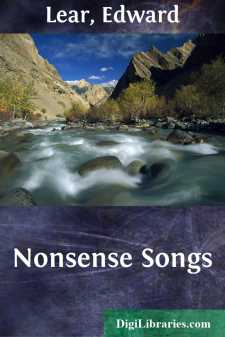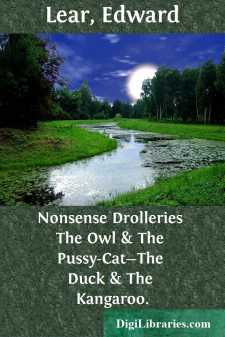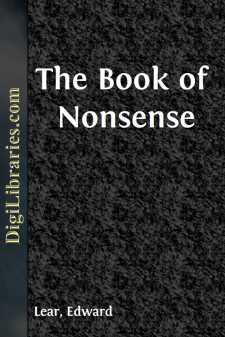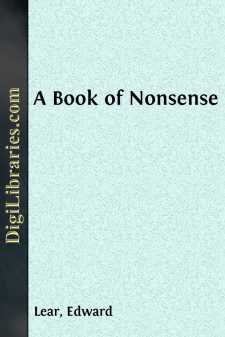Categories
- Antiques & Collectibles 13
- Architecture 36
- Art 48
- Bibles 22
- Biography & Autobiography 813
- Body, Mind & Spirit 142
- Business & Economics 28
- Children's Books 17
- Children's Fiction 14
- Computers 4
- Cooking 94
- Crafts & Hobbies 4
- Drama 346
- Education 46
- Family & Relationships 57
- Fiction 11829
- Games 19
- Gardening 17
- Health & Fitness 34
- History 1377
- House & Home 1
- Humor 147
- Juvenile Fiction 1873
- Juvenile Nonfiction 202
- Language Arts & Disciplines 88
- Law 16
- Literary Collections 686
- Literary Criticism 179
- Mathematics 13
- Medical 41
- Music 40
- Nature 179
- Non-Classifiable 1768
- Performing Arts 7
- Periodicals 1453
- Philosophy 64
- Photography 2
- Poetry 896
- Political Science 203
- Psychology 42
- Reference 154
- Religion 513
- Science 126
- Self-Help 84
- Social Science 81
- Sports & Recreation 34
- Study Aids 3
- Technology & Engineering 59
- Transportation 23
- Travel 463
- True Crime 29
Edward Lear
Edward Lear (1812–1888) was an English artist, illustrator, musician, author, and poet renowned for his literary nonsense, particularly his limericks. He is best known for his book "A Book of Nonsense," which popularized the limerick form, and his whimsical poem "The Owl and the Pussycat." Lear's work has had a lasting influence on children's literature and the genre of nonsense poetry.
Author's Books:
Sort by:
by:
Edward Lear
THE OWL AND THE PUSSY-CAT. I. The Owl and the Pussy-Cat went to seaIn a beautiful pea-green boat: They took some honey, and plenty of moneyWrapped up in a five-pound note. The Owl looked up to the stars above,And sang to a small guitar, "O lovely Pussy, O Pussy, my love,What a beautiful Pussy you are, You are, You are! What a beautiful Pussy you are!" II. Pussy said to the Owl, "You elegant...
more...
by:
Edward Lear
"HOW PLEASANT TO KNOW MR. LEAR!" "How pleasant to know Mr. Lear!"Who has written such volumes of stuff! Some think him ill-tempered and queer,But a few think him pleasant enough. His mind is concrete and fastidious,His nose is remarkably big; His visage is more or less hideous,His beard it resembles a wig. He has ears, and two eyes, and ten fingers,Leastways if you reckon two thumbs;...
more...
by:
Edward Lear
heOwl and the Pussy-Cat went to seaIn a beautiful pea-green boat,They took some honey, and plenty of moneyWrapped up in a five-pound note.The Owl looked up to the stars above,And sang to a small guitar,"O lovely Pussy! O Pussy, my love,What a beautiful Pussy you are,You are,You are!What a beautiful Pussy you are!"Pussy said to the Owl, "You elegant fowl!How charmingly sweet you sing!O let us...
more...
by:
Edward Lear
INTRODUCTION. In offering this little book—the third of its kind—to the public, I am glad to take the opportunity of recording the pleasure I have received at the appreciation its predecessors have met with, as attested by their wide circulation, and by the universally kind notices of them from the Press. To have been the means of administering innocent mirth to thousands, may surely be a just...
more...
by:
Edward Lear
1. There was an Old Man with a beard,Who said, "It is just as I feared!—Two Owls and a Hen,Four Larks and a Wren,Have all built their nests in my beard!" There was a Young Lady of Ryde,Whose shoe-strings were seldom untied;She purchased some clogs,And some small spotty dogs,And frequently walked about Ryde. 3. There was an Old Man with a nose,Who said, "If you choose to suppose,That my...
more...
by:
Edward Lear
THE DONG WITH A LUMINOUS NOSE. When awful darkness and silence reignOver the great Gromboolian plain,Through the long, long wintry nights; When the angry breakers roarAs they beat on the rocky shore;When Storm-clouds brood on the towering heights Of the Hills of the Chankly Bore,— Then, through the vast and gloomy darkThere moves what seems a fiery spark,—A lonely spark with silvery rays Piercing...
more...
by:
Edward Lear
There was an Old Man with a nose,Who said, "If you choose to supposeThat my nose is too long, you are certainly wrong!"That remarkable Man with a nose. There was a Young Person of Smyrna,Whose Grandmother threatened to burn her;But she seized on the Cat, and said, "Granny, burn that!You incongruous Old Woman of Smyrna!" There was an Old Man on a hill,Who seldom, if ever, stood still;He...
more...








